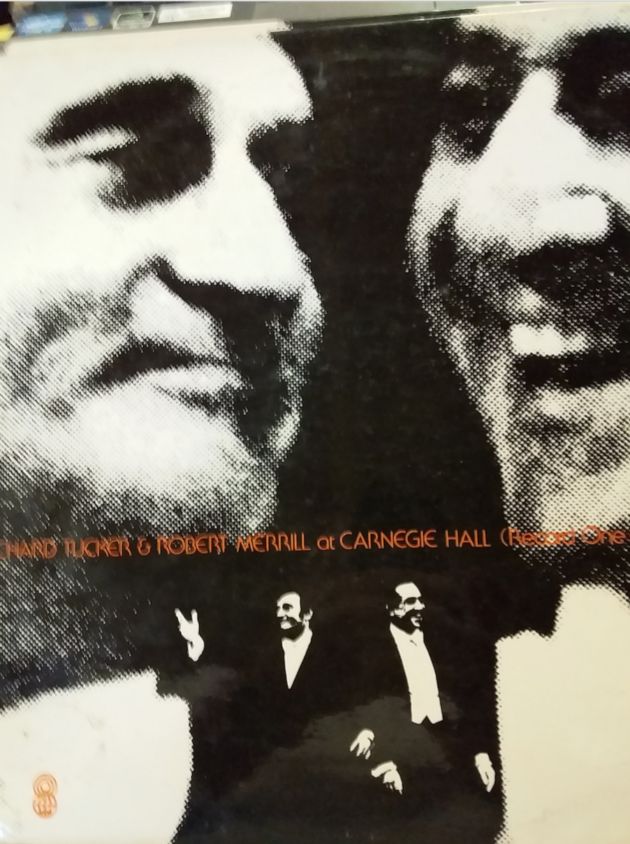As I type this, I have before me a double-album (vinyl) I purchased in August 1975, a live recording of an epic concert at Carnegie Hall two and a half years earlier by Metropolitan Opera titans Richard Tucker and Robert Merrill. Not long ago, when a budding young baritone friend was visiting, we listened and thrilled to the entire concert. It’s worth quoting part of the liner notes about the atmosphere on the night:

“A well-known TV sportscaster and a popular night-club comedian were among hundreds turned away at the Carnegie Hall box-office that Sunday night in January. In fact for several weeks ahead you couldn’t have bought a ticket for love or money. By 7.45 the traffic at the corner of 7th Avenue and 57th Street was at a standstill as the fortunate 2,784 poured out of limousines, taxis and buses and disgorged from the subways:
Jet-set celebrities chic in their Tregieres and Cardins; matrons from Westchester and Long Island loaded down with Winston diamonds; world-acclaimed prima donnas swathed in mink and primi uomini swaddling their million-dollar throats in cashmere; aged Hassidim from Williamsburgh with broad-brimmed beavers and payess and young yeschivabuchers topped with gay, crocheted yarmulkes; the familiar standees from the Met clutching a record sleeve or battered Aida programme to be autographed, or sneaking a pocket tape-recorder past the ticket-taker; kids in blue jeans with long hair whom you might have expected to see rocking with The Jefferson Airplane or The Byrds in the heyday of Fillmore East; and a lot of ordinary middle-class people who watch the Mike Douglas and “Tonight” shows faithfully, but quite possibly had never before been to a live concert.
“Inside the venerable white, gold and crimson landmark auditorium, the air was charged with electricity and there was the kind of expectation buzzing through the five-layered crowd that one associates with the final ball game of a tied World Series at Shea Stadium or a world heavyweight championship fight at Madison Square Garden. … It was a rich feast of vocal splendors with the ringing high B-flats and the booming A-flats resounding effortlessly to the top balcony.”
Forty-six years on, at cold, bum-unfriendly, 300-seat St. Andrew’s on The Terrace in Wellington, New Zealand, a musically comparable feast was laid out for a less-than-capacity crowd. The singing was on a par with Tucker and Merrill (in some respects better) but such has been the cultural degeneration of the past few decades that this concert, which should have been held in the Michael Fowler Centre and accompanied by the New Zealand Symphony Orchestra (not to in any way diminish the exemplary accompaniment of the legendary Terence Dennis) was somehow relegated to the status of an under-publicised, unrelated also-ran.
The night before, our brilliant national orchestra had been reduced to musical masturbation (Michael Norris, Carl Nielsen) to a half-full Fowler Centre, wasting a good pianist (Steven Osborne) on some token Mozart in the process. Why not O’Neill/Paterson instead? (Bring on the upcoming Beethoven-fest, unpolluted by modernity!)
Symptomatic of the shambolicism was the tiny one-page flyer on which the programme was laid out in unreadable font. I managed to lose mine (not difficult) but it matters little since much of what was printed on it was not sung and much of what was sung was not printed on it. What matters is that this was singing of the highest order, of material even more challenging in the versatility it demanded than that which Tucker/Merrill took on.
Beethoven, Schubert, Wagner, Verdi, Puccini, R. Strauss, R. Vaughn Williams, Bizet, Tosti, Rogers and Hammerstein, Nicholas Brodsky, Guy d’Hardelot … French, German, Italian, English, Irish (Mr O’Neill’s Danny Boy!), Scottish (Mr Paterson’s spoken introductions) … beauty piled on grandeur piled on heroic magnificence.
The kilted Mr Paterson displayed a formidable bass-baritone (baritone?), with his Don Carlo aria in particular being a tour de force. It drops down to a low G at one point, which he negotiated with ease; the impact of his final “Amor [up to an E] per me non ha” was shattering. To hear him sing Ezio Pinza’s hit, Some Enchanted Evening, as well as the master was equally a joy. Simon O’Neill, too, was at the top of his game. He is a skilled linguist and master-articulator, every syllable being identifiable in whichever language. The voice has beauty and squillo from bottom to top, and that top is as secure and thrilling as I’ve ever heard it.
Aside from the inevitable Wagner it was gratifying to hear him sing two gorgeous ballads by the unjustly-ignored Paolo Tosti; and of course, no audience member was more thrilled than this one when he launched, with due genuflection, into a Mario Lanza medley. It would be churlish to mention that Simon opted out of the high C ending to Be My Love without also mentioning that so too does everyone else who assays it!
This was first-class singing by first-class singers backed by a first-class accompanist. The actual audience on the day knew it and responded with a rapturous standing ovation. One of them e-mailed me the following day, “I thought the singing yesterday was quite the most thrilling I’ve heard for many a day.” Amen! What was lacking was the first-class venue and the first-class promotion the event deserved. The unjust denial of World Cup honours to the Black Caps pales into insignificance next to the enormity of this travesty!

